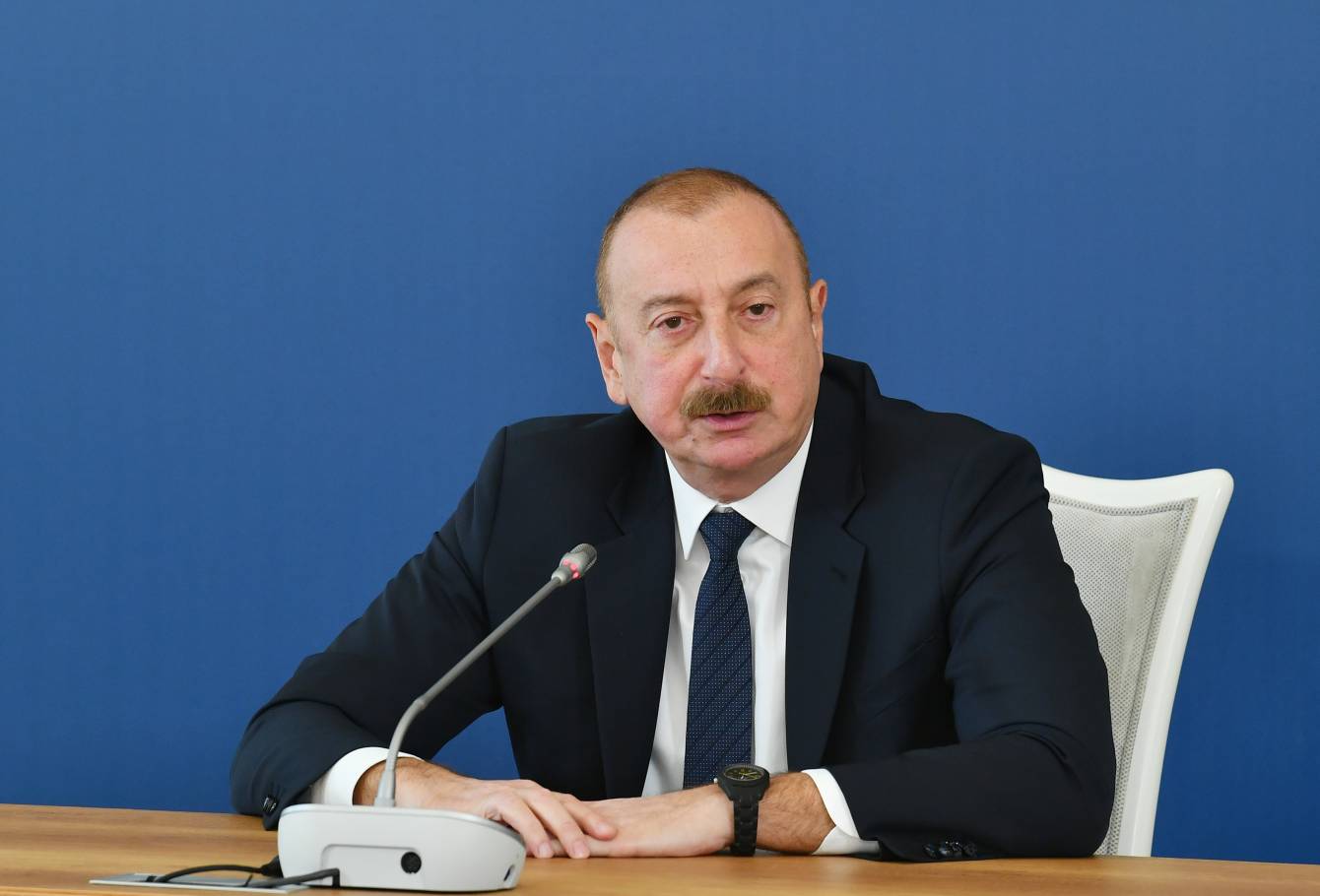President Ilham Aliyev expressed his opinion regarding the current state of Azerbaijan’s relationship with Iran, stressing that the tension between the two nations is at its lowest level and the future of their relationship is uncertain.
The statement was made at the international conference on “Shaping the Geopolitics of the Greater Eurasia: From Past to Present to Future” held in Shusha on May 3.
“You can now imagine that relations between Azerbaijan and Iran are at the lowest level ever. It is very difficult to predict whether they will remain on that level, whether they will go down or they will go up,” Ilham Aliyev said, according to the statement issued by his press service.
The president said the escalation was a result of several steps taken after the Second Karabakh War, adding that Azerbaijan was not the initiator of these actions.
“And, of course, if you look at the chronology of these steps, you will see that Azerbaijan was not the initiator. And why should we be initiators? We have such a huge challenge and task in front of us – the reconstruction of Karabakh and East Zangezur. We do not have the need to have any problems with any country, especially with a neighboring country,” he said.
According to President Aliyev, the tension between Tehran and Baku escalated after the detection of Iranian trucks making regular illegal movements to Azerbaijan’s Karabakh region through the road between Lachin and Khankendi.
“Two of these trucks were detained, and the drivers were arrested. In the traffic papers, we saw that the cargo was sent from one of the Iranian cities, and the destination was Stepanakert, Armenia. Can you imagine that? And we have all these documents. It's not just the word Stepanakert. First, it is not Stepanakert; it is Khankendi. Second, it is not Armenia,” Ilham Aliyev said, adding that the arrest of drivers created a lot of waves in some parts of the Iranian establishment, resulting in accusations and threats directed towards Azerbaijan.
The Azerbaijani president further recalled some contradictory decisions made in the Islamic Republic following the 2020 war between Azerbaijan and Armenia, including the military drills on the border with Azerbaijan, and the terrorist attack on the Azerbaijani embassy in Tehran.
Iran held large-scale military drills in September 2021 and October 2022 in its border territories with Azerbaijan. The drills were carried out in close proximity to the lands that Azerbaijan had recently liberated from Armenian occupation. Notably, during the years of occupation, Iran did not conduct any such war games near the Azerbaijani border.
A terrorist attack on the Azerbaijani embassy in January 2023 have strained the already tense relationship between the two countries. During the attack, an armed assailant killed the embassy’s security chief and injured two security service officers. Azerbaijan accused members of Iran’s political establishment of allowing the crime to occur and avoiding a transparent investigation into the incident. In response, Baku evacuated the embassy’s staff, closed the diplomatic mission, and demanded that Tehran launch an immediate investigation into the crime, detain the perpetrators, and provide information about the results of the investigation.
In March 2023, an aircraft from Iran’s Air Force conducted a one-hour flight along the Azerbaijan-Iran state border. The military plane flew at a distance of 3-5 km from the state border, and in some cases over the state border. Azerbaijan strongly condemned this provocative action by the Islamic Republic and urged Iran to refrain from similar actions in the future.
According to Ilham Aliyev, Azerbaijan has received some communication from Iranian officials, including phone calls and other forms of contact, regarding proposals to normalize relations between the two countries. However, he emphasized that there are certain demands from Azerbaijan that need to be addressed before any normalization can take place.
“Our demands are absolutely legitimate and justified. If these demands are met, then we can talk about normalization. If not, then not. So, again, it was not our choice. But everybody in Iran, all segments of the establishment, should finally understand that the language of threats and terror will not work with Azerbaijan. The sooner they understand, the better we can see signs of normalization,” the president concluded.







 The Mine Action Agency of Azerbaijan (ANAMA) reported on Thursday the discovery of a significant amount of explosives in the Khojavand district of ...
The Mine Action Agency of Azerbaijan (ANAMA) reported on Thursday the discovery of a significant amount of explosives in the Khojavand district of ...
 Iran’s Foreign Minister, Hossein Amir-Abdollahian, has labeled a foiled Israeli drone attack in certain parts of the country as a "failure" for Isr...
Iran’s Foreign Minister, Hossein Amir-Abdollahian, has labeled a foiled Israeli drone attack in certain parts of the country as a "failure" for Isr...
 Iran has refuted reports of alleged damage to Shimon Peres Negev Nuclear Research Centre located southeast of Dimona, Israel, during the recent air...
Iran has refuted reports of alleged damage to Shimon Peres Negev Nuclear Research Centre located southeast of Dimona, Israel, during the recent air...



